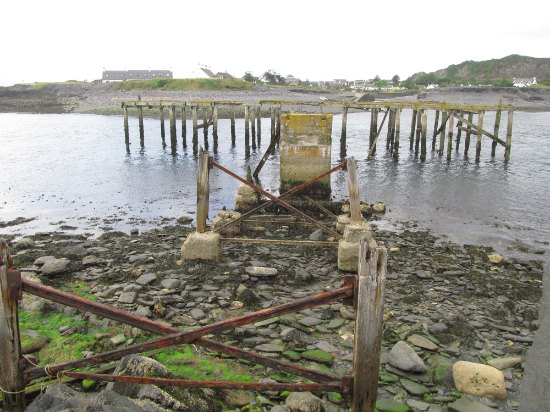Things will Never be the Same Again

What and where is this? Or more realistically, what was this (it’s still in the same place)? The large pile of broken slates may give you a clue, provided you know something about the Scottish slate industry.
It is the pier at Ellenabeich on the small island of Seil, a few miles south of Oban. The district, and especially Easdale the island at the top of the picture, had a thriving slate industry, which at its peak exported worldwide 9 million slates a year. But in 1881 a disastrous combination of wind and high tides flooded the quarries, which in some cases went as deep as 80 metres below sea level. Fortunately none of the 500 quarriers were in the quarries at the time, and no lives were lost. But almost all the livelihoods were. The industry never recovered, and production finally stopped around 1914. And so what was once a busy thriving pier became redundant. There was nothing wrong in itself, it had just outlived its usefulness, through changed circumstances.
You might think there is no connection between the pier and Coronavirus, and in one sense you’re right. But there is. The lives of the quarrymen were changed in an instant. Our lives have been changed over the course of a few months. But for us (though I suspect not for the quarriers) there is a silver lining: it has made us rethink so many aspects of our lives. What is really important? What were we doing, just because we always had? What had become redundant and should be left behind? Things we did might have been very useful in the past – necessary even – but now no longer serve any useful function. The pier became obsolete overnight. We have had a few months to consider the questions.
As Christians, we are encouraged constantly to examine our lives and think where we could improve. As John put it in his first letter:
If we claim that we’re free from sin, we’re only fooling ourselves. A claim like that is errant* nonsense. (1 John 1:8 The Message Bible)
Since lockdown, most of us have become acquainted with doing things differently; in particular the use of Zoom and other methods of communicating virtually. Would we be doing so now, if we hadn’t been forced into it? For me, no. I had never even heard of Zoom before March. But so quickly we can see the benefits, and we should be careful not to lose them. It will mean working and worshipping in different ways, but as someone said, “God is big enough to cope with that”.
Hymn 393 in the Green Hymn Book is rarely sung, but each verse starts with a line that has never been more true:
Change is our portion now
The implication is perhaps that change is not to be welcomed. If the author was thinking of advancing years and ultimately dying, he was right, but the message is correct and important in other ways.
Those who met Jesus had their lives changed radically:
- Zacchaeus, who changed from being a dishonest money-grabbing tax collector
- Some ordinary fishermen, who became church leaders and preachers
- The woman at the well in Samaria
- Those who were healed of physical or mental illnesses
- The apostle Paul, changed from a persecutor to a leading evangelist
The list could go on. Our lives are unlikely to be so dramatically affected, though there are accounts of some today whose lives have been turned round completely by following Jesus. Most of us have the blessing of living in a supportive family, in a civilised society and in a relatively safe country. But perhaps that can lull us into a false sense of security. Do we take for granted
- the houses we have?
- the money we have?
- the family and friends we have?
- the food and drink we have?
- knowing not just about Jesus, but knowing that we are loved by him and God?
- the freedom to worship God as we wish?
Are we in danger of not really thinking about what we do and why? There are probably many things we could do better if we stopped and thought. Someone gave us a flip-over collection of sayings about getting old (can’t think why). One of them is “Progress was fine when I was young, but now it’s gone on far too long”. There is a danger that we get set in our ways, and think that is the only and correct way to do things. If we look back, not into history but into our own earlier days, we can see how things at the time that were frowned upon, or even strongly resisted, have now become accepted:
- using you instead of thou and thee in prayers
- sitting instead of standing in church for prayer
- having a television
- going to the theatre, or worse, the cinema
- using a piano instead of an organ to accompany hymns
So change is not always to be resisted, but rationally evaluated and embraced where helpful.
As followers of Jesus, we should be changing and progressing throughout our life to become more like him. Paul realised that he had still got some way to go:
I’m not saying that I have this all together, that I have made it. But I am well on my way, reaching out to Christ, who has so wondrously reached out for me. Friends, don’t get me wrong: By no means do I count myself an expert in all of this, but I’ve got my eye on the goal, where God is beckoning us onward – to Jesus. I’m off and running, and I’m not turning back. (Philippians 3:12-14 The Message Bible)
I don’t know what happened to the quarrymen after the disastrous flooding. Nor do I know what will result from the severe disruption to our lives caused by the Coronavirus pandemic. But let us be optimistic that from enforced change will come new better ways of doing things and leading our lives more as God would like them to be. As Sir Winston Churchill said:
A pessimist sees difficulty in every opportunity, an optimist sees opportunity in every difficulty.
So things shouldn’t be the same again, they should be better.
And remember that finally “we will all be changed” (1 Corinthians 15:51 NIV)
*Is this word American for ‘arrant’ – complete and utter? Or its usual meaning in Britain of ‘behaving wrongly’? Both seem to fit.
DMcH
